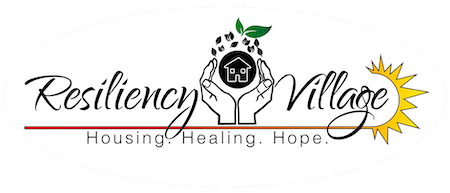Chairman Lloyd Mathiesen and the Chicken Ranch Tribal Council present the Board of Directors of Resiliency Village a check for $150,000.00
June has been a busy month at Resiliency Village. As you can see in the above picture, we are fortunate to have formed sponsorship with the Chicken Ranch band of the Me-Wuk. We are honored by their generosity and thrilled with the prospect of building our village together as family.
The Chicken Ranch band of Me-Wuk Indians of California is a federally recognized Indian tribe located in the foothills of the Sierra Nevada Mountains in Tuolumne County, California. Although the ancestors of the current Tribal members have occupied lands in the area since long before the arrival of Europeans in North America, the Tribe’s original reservations, as established on October 24, 1908, consisted of roughly 40 acres below the town of Jamestown.
In 1958, the U.S. Congress passed the California Rancheria Act which terminated the federally recognized status of 41 rancherias within the state, including that of Chicken Ranch Rancheria. The goal of this act was to eliminate the many small reservations and promote assimilation into the surrounding community. The act was officially enforced against Chicken Ranch Rancheria in 1961 when their tribal status was terminated. At that time, the trust status of rancheria lands was ended, and the lands were distributed to adult residents.
Prior to termination, most Tribal Members lived in substandard housing with little or no infrastructure. Despite requirements of the Rancheria Act for the Department of the Interior to provide these facilities, they did not do so. As soon as the trust status of the Rancheria land was terminated, Tribal Member homes became subject to county planning, zoning, and building laws. Subsequently, county officials issued citations to Tribal Members whose homes and parcels failed to meet required standards. As a result, many Tribal Members were prohibited from living in their homes, and few had enough money to bring their homes into compliance. Most were forced to sell their property, essentially eliminating Tribal ownership of most of the original Rancheria by the late 1960s.
In 1979, 17 rancherias united to file a class action suit to restore their reservation status, and in 1983, the plaintiffs prevailed. The 17 victorious rancherias include Chicken Ranch Rancheria. In 1985, Chicken Ranch Rancheria formally regained their federally recognized status. Unfortunately, in the 24 years between termination and re-establishment of the Tribe, only one Tribal member, Inez Mathiesen, had her remaining 3-acre parcel—roughly 7% of the original reservation—taken back into trust.
The Rancheria Act is primarily responsible for a tremendous loss of much of the Tribe’s culture, religion, ceremonies, language, and lands. Thanks to the leadership of Chairman Lloyd Mathiesen, Vice-Chairman, Raymond Mathiesen, and other members of the Tribal Board, there is renewed hope for restoring these irreplaceable cultural assets. Currently, Tribal members are actively working toward regaining vital attributes of their culture, history, and language.
Resiliency Village Executive Director and The Board of Directors of Resiliency Village support and respect these Tribal efforts. We value the Tribe’s sponsorship and commitment to community service. Chicken Ranch Band of Me-Wuk recognizes the importance of helping our marginalized citizens, not only through heart commitment but through generational trauma experience. Again, we thank the Chicken Ranch Tribal Council, and the Mathiesen family for all they do to honor their ancestors and ancestral land.
Chicken Ranch Tribal Office, June 17, 2020—photo credits, Damian Riley


